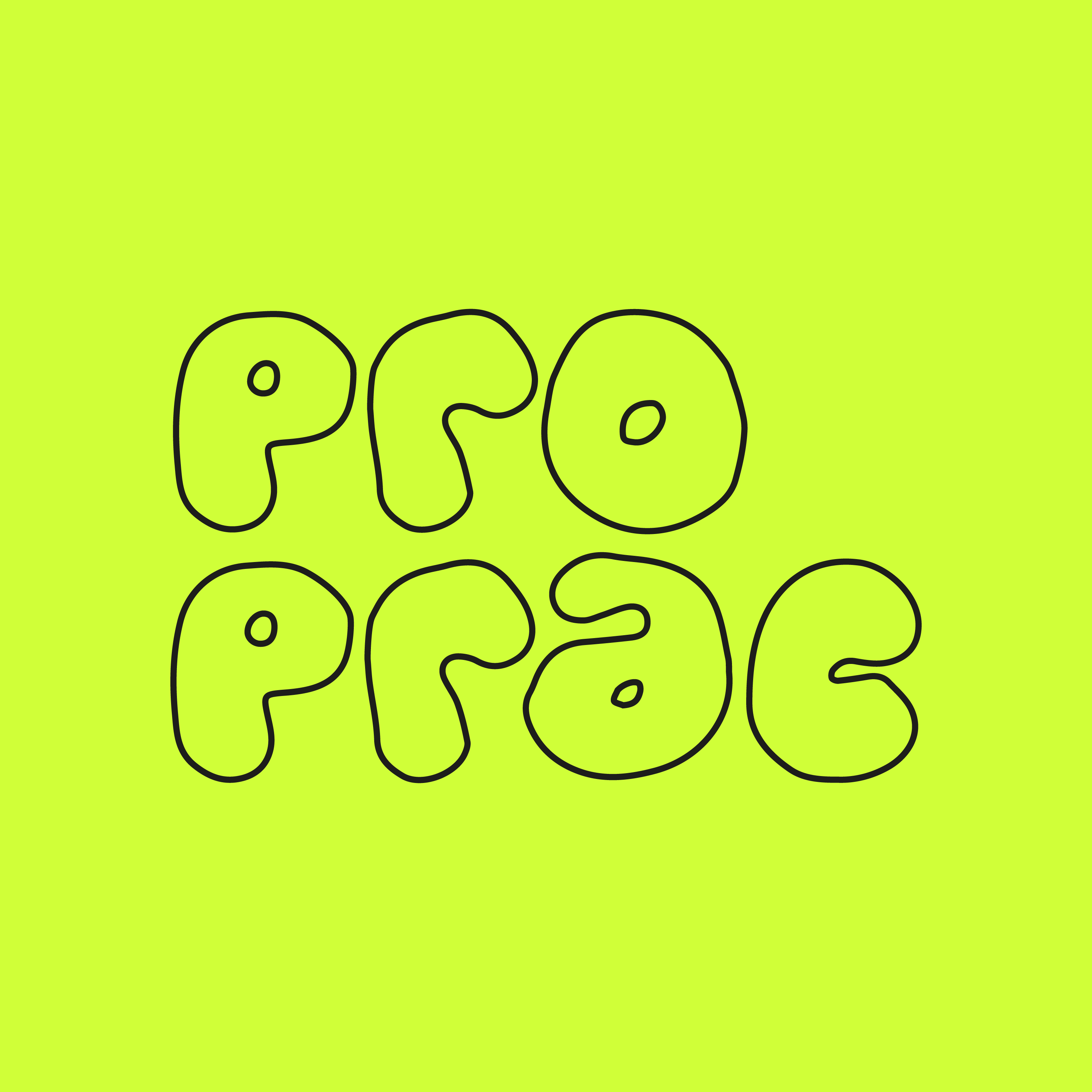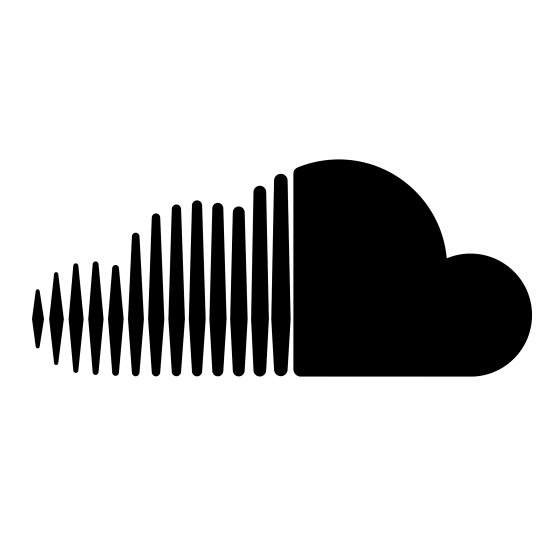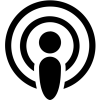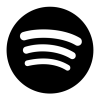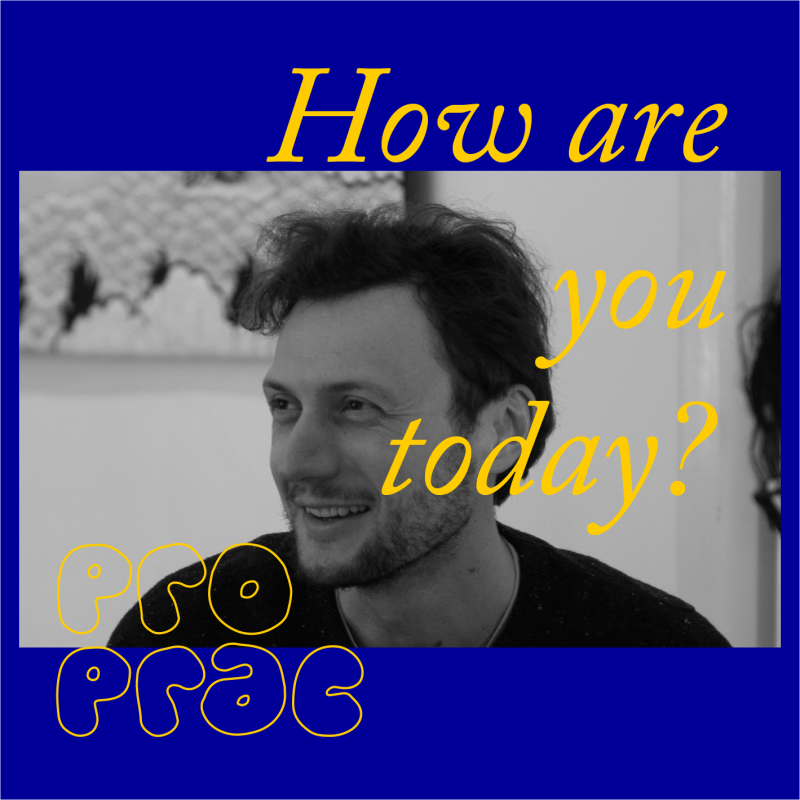
Stephen Palmer
How Are You Today – Episode 15
Resources
Transcript
Kiera Brew Kurec 00:04
Hi, and welcome to Pro Prac. I’m Kiera Brew Kurec
Nick Breedon 00:07
And I’m Nick Breedon. You’re listening to How Are You Today?, a spin off series where we call an artist and check in with how Coronavirus is affecting them, and ask them to share their worries and their hopes for the future.
Stephen Palmer 00:22
Hello?
Kiera Brew Kurec 00:22
Hi, Stephen. It’s Kiera and Nick.
Nick Breedon 00:25
Hey,
Kiera Brew Kurec 00:25
Hi, Hi, Kiera and Nick How are you doing? Good. How are you today?
Stephen Palmer 00:31
Oh, look, I’m pretty good. Thank you. You’ve caught me on a good day. Yes, you know, sun’s shining and I don’t know, I tend to kind of start off the days pretty positive at the moment and then sort of cycle in anxiety and despair later in the evening (Laughter)
Kiera Brew Kurec 00:58
Well, at least you’re not waking up with it.
Stephen Palmer 01:01
Yeah, that’s right, depending on how much you know, news media and social media I have consumed
Nick Breedon 01:08
Yeah, I can definitely relate to that.
Kiera Brew Kurec 01:11
I’m just wondering if you could share with us if you have been affected by Covid 19, either personally, or in your practice professionally, in any way?
Stephen Palmer 01:20
Um I guess, Well, yes. In, in that I suppose everyone has. I haven’t really been particularly affected in terms of my practice, I suppose. But I guess, I guess day to day life has shifted considerably. And yeah, so I’ve actually just finished a very kind of intensive period of teaching, which is what I do for a living I am a sessional lecturer and tutor and, you know, things kind of went a bit crazy in the university sector. And, you know, I was very fortunate to have plenty of work, you know, many people, of course, lost work and, or, you know put in quite difficult circumstances. But for me, I had a lot of work, and then sort of had to work out how to manage that with doing homeschool half the week. Which was, you know, intensive, but, um, but also, you know, kind of rewarding, in some ways, frustrating and others. And, yeah, so, I guess my practice is mainly been on hold for that reason that, but then that’s not unusual for me, I tend to work, you know, in phases, or stops and starts, depending on where I can fit projects in and have deadlines falling and things like that. And I didn’t really have much sort of lined up for this year in that regard. Yeah, so, I mean, I do have a couple of collaborative projects that I suppose were kind of slowed down or altered a little bit, but But in a way, they all this particular project that I’m involved in, which is about starting a union for visual artists, really needed to obviously, it’s not something that can just kind of sail on in light of circumstances but is you know, completely altered and perhaps and has to be sort of responsive to the way things are changing.
Kiera Brew Kurec 04:15
Yeah I’m so interested to hear more about that. I’m wondering if you could just touch on for a moment how your students adapted to having to start learning remotely and how you think that might have impacted their progress in any way not being able to be in the studio.
Stephen Palmer 04:45
Yeah, it’s interesting. So I teach a range of different students. The main cohort of students I teach are in a Master’s of design which is 80 or 90% international students, a number of them studied remotely, because they’re locked out of the country, the larger chunk, were here in Australia, but yeah, having to also study online, obviously. And I think, yeah, many of them face quite a challenge. Because the, you know, the remote sort of style of learning, Well, you know, it’s weak in many ways, or, you know, it’s not the same as face to face, in, in many ways. And for students with, you know, learning in, you know, a second language and possibly engaged in a Western University for the first time, where, you know, there are particular types of expectations and styles and often unspoken protocols and things. You know, it’s always a challenge anyway, for those students. And I think this really accentuated that. I have also teach local students who are in their first semester of studies, and I think that was quite interesting. Personally, I think I’d be massively confused if I began my degree, first degree, as a 18, 19 year old and and it’s all online, you know. And you having to cope with kind of like, have a conversation with a bunch of people you don’t know, maybe 18-20 other students in a Zoom Room?
Nick Breedon 06:45
Yeah awkward
Stephen Palmer 06:48
Totally awkward. So yeah, it was it was certainly strange. And I think some students really struggled. And, but then also, it did kind of become normalized after a couple of months. And, you know, it’s like, here we are back in the zoom. And this is what we do now. And so yeah, it’s interesting how quickly people do adapt. Yeah.
Nick Breedon 07:23
Has your routine changed at all while you’ve been in lockdown? And now as we kind of emerge out of isolation?
Stephen Palmer 07:29
Yeah, in some ways, but in others not, I guess. Not having to get myself out to Caulfield, several times a week has made a big difference. And, and, yeah, that I mean, during the homeschooling period, and yeah, I guess, the kind of stricter social distancing measures, I sort of felt like, I never left the house. And it was this intensely focused period where I was either, like, on my computer working or on another computer trying to get my son to do some lessons. or playing with him. And of course, you know, we didn’t go out and see anyone. So it was just like, a lot of really, and, you know, and it was beautiful, but also kind of quite different. I felt quite isolated, like, just playing with him. And, and he kind of, at first at least, was really missing school. And so the social connection with other people. So for that reason, he wanted a lot of attention. So it was really like, every minute, you know, I had to be involved in every single thing. So. So yeah, it was kind of like, you know, a journey. But it’s like, we kind of got into the rhythm and got a lot out of it.
Kiera Brew Kurec 09:02
Yeah, yeah. It’s I’ve been feeling like each week is such a different kind of has a different feeling about it. And when I reflect on where we were even just a month ago, it just feels so different to now.
Stephen Palmer 09:19
Yeah, that’s right. I guess things are changing quite quickly.
Kiera Brew Kurec 09:23
Yeah. This is a bit of a big question. But we’re wondering if you wouldn’t mind sharing if there’s anything you’re currently worried about.
09:31
You know, I guess there’s a lot of anxiety, you know, broadly over the last few months, and it’s sort of hard to know how to feel now that things in some ways are um feeling less ominous. At least in terms of, you know, the virus’s kind of current impact here. But you know, yes, we just said things are changing very quickly. And it’s sort of now this sort of open question or, or it’s like people are sort of waiting what’s going to see what’s going to happen next, you know? Yeah. I guess both in terms of the virus in terms of the Black Lives Matter movement And also, of course, like, what, what is the state, Sorry, the federal government will kind of do in light of trying to open things up and restrict the sort of safety net that’s been kind of laid out in response, and so on. So yeah, I kind of feel quiet. Yeah, like, I’m sort of just waiting. I don’t know whether to feel anxious, or, you know, we should be kind of trying to take some sort of action, or what, I’m quite unclear.
Nick Breedon 11:13
On the flip side of that, what are you hopeful for at the moment?
Stephen Palmer 11:16
Well, I think, um, you know, across a bunch of different contexts and communities, that there has been a lot of, like a sense of people trying to support each other, and look out for each other and work together. You know, share experience and knowledge and so on. And that, you know, I think that’s been quite a hopeful thing to watch. You know, I guess I’m thinking on the level of the arts sector, of course. But also just seeing people kind of form initiatives to sort of support each other locally. And in the university, and so I guess I’m kind of hopeful that, yeah, this sort of jolt or change kind of circumstances, will really prompt that to continue. I mean, like, just to take the university example, like, in my experience of being a sessional, teacher, everyone I’ve kind of worked with, seems very isolated, and both in just kind of day to day practice of teaching, but also, but also just having a sense of like, you know, being in a kind of community or a conversation about, you know, those conditions that surround that. So I guess, yeah, I guess I’m hopeful that, that those conversations that have now been started or really being prompted by the situation will continue and, and, and they will be kind of tighter you know, stronger sort of networks of people working in different places.
Kiera Brew Kurec 13:22
Well, we might wrap it up there. But before we go, do you have a public Instagram or website that you are happy to share for our audience to be able to follow what you’re working on and doing?
Stephen Palmer 13:36
You can find me at stephenpalmer.com.au. And I’ll also mention artists union.com.au and you can follow that project if you are interested in that.
Kiera Brew Kurec 13:49
Thank you so much for taking the time to speak with us today.
Stephen Palmer 13:52
Thanks so much.
Kiera Brew Kurec 13:54
Bye.
Stephen Palmer 13:55
Bye.
Nick Breedon 14:00
We respectfully acknowledge the traditional owners of the land, the Wurundjeri people of the Kulin nation and pay respect to their elders past, present and emerging and the elders of the lands that this podcast reaches you on today, we extend that respect to all First Nations people listening today and acknowledge that sovereignty has never been ceded.
Kiera Brew Kurec 14:17
How Are You Today? has been generously supported by the city of Melbourne’s quick response grants. Follow us at Pro Prac podcast on Instagram or email us at Pro Prac pod@gmail.com. If you haven’t already, please subscribe on whatever you listen to podcasts on.
Nick Breedon 14:32
Please stay in touch. We’d love to hear what you’re up to as well.

Pro Prac acknowledges City of Melbourne’s generous contribution to How Are You Today? through their Quick Response grants program
